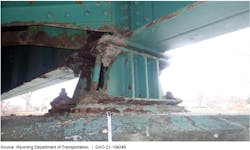GAO recommends FHWA better assist states with corrosion practices
The U.S. Government Accountability Office (GAO) this week released a report saying that the Federal Highway Administration (FHWA) could better assist states with information on corrosion practices.
The agency said state officials interviewed by the GAO said they needed more information about effective corrosion mitigation practices for specific environments and circumstances. GAO recommends FHWA provides this information as part of its ongoing bridge preservation efforts.
GAO found that according to the FHWA database of information on bridge conditions, the percentage of deck area for National Highway System (NHS) bridges in poor condition has decreased since 2012. However, since 2016, the percentage of deck area for NHS bridges in good condition has also decreased, while the percentage of deck area for bridges in fair condition has increased. Although these data do not indicate the extent to which corrosion affects bridges' condition, studies GAO reviewed and stakeholders GAO spoke with—including FHWA, five selected states, and six associations—indicate a significant relationship between corrosion and bridge condition, GAO says.
GAO said FHWA efforts have generally focused on overall bridge condition and may not meet states' needs to determine the circumstances in which to use specific practices. For example, FHWA's Bridge Preservation Guide identifies practices that can be part of a bridge preservation approach but does not indicate under what circumstances they are most effective.
"Although FHWA does not endorse specific practices, officials recognize their role in helping states make well-informed decisions regarding bridge corrosion," GAO says. "As states continue transitioning to an asset management approach, providing information about the circumstances under which different corrosion practices are most effective could help states make best use of their resources."
GAO is recommending that FHWA's ongoing bridge preservation efforts include activities that focus on addressing the challenges states face with determining the circumstances under which specific corrosion practices and materials are most effective. The full report can be found on GAO's website.
---------
SOURCE: U.S. Government Accountability Office
